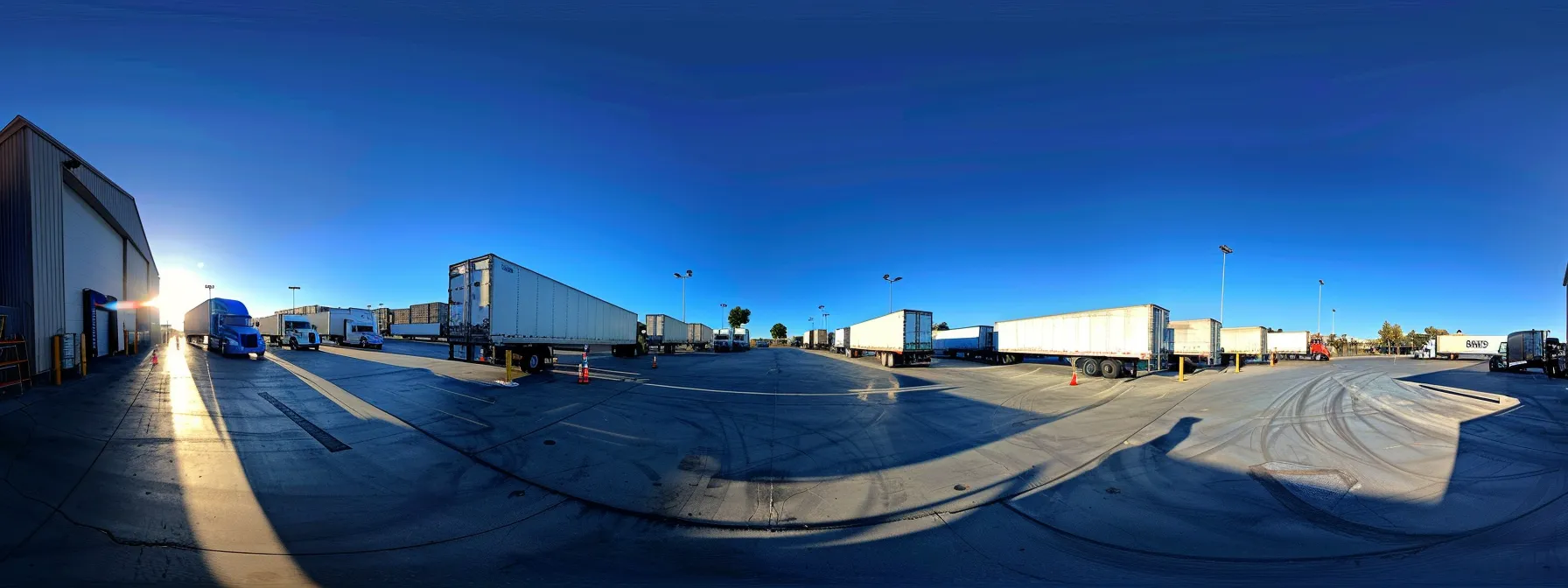Are you struggling to optimize your shipping operations? Full Truckload (FTL) logistics can be the key to efficient cargo transport. This guide will explore the benefits of FTL shipping, strategies for maximizing efficiency, and best practices for working with FTL logistics companies.
You’ll learn how to overcome common challenges and stay ahead of future trends in truckload shipping. By mastering FTL logistics, you can reduce costs, improve delivery times, and enhance your overall supply chain performance.
Key Takeaways
- FTL shipping offers cost efficiency and faster transit times for large cargo volumes
- Selecting reliable carriers and optimizing routes are crucial for efficient FTL logistics
- Real-time tracking and data analytics enhance visibility and decision-making in FTL operations
- Sustainable practices and automation are shaping the future of FTL transportation
- Adapting to changing market demands requires flexible and customized FTL shipping solutions
Understanding Full Truckload (FTL) Logistics

full truckload (FTL) logistics plays a crucial role in freight transport, offering efficient shipping solutions for large cargo volumes. This section explores FTL shipping’s definition and importance, its differences from other freight options, its impact on global supply chains, and the industries that rely heavily on FTL services.
Understanding these aspects helps shippers optimize their logistics strategies, working effectively with freight forwarders to ensure smooth road transport using trailers and appropriate insurance coverage.
Defining FTL Shipping and Its Importance
Full Truckload (FTL) shipping is a logistics method where our services an entire truck is dedicated to transporting a single shipper’s goods. This approach maximizes cost efficiency for large shipments, as it eliminates the need for multiple stops and reduces handling, making it ideal for time-sensitive or high-volume cargo.
FTL logistics plays a crucial role in optimizing warehouse space and streamlining road transport operations.
The importance of FTL shipping lies in its ability to provide faster transit times and reduced risk of damage compared to other shipping methods. By utilizing the full capacity of a truck, shippers can benefit from economies of scale, often resulting in lower per-unit shipping costs.
This makes FTL an essential component of efficient supply chain management, particularly for industries that rely on large-scale transportation of goods over long distances. Check out our services on our Facebook
How FTL Differs From Other Freight Options
FTL shipping differs from other freight options primarily in its dedicated use of an entire truck for a single shipment. This approach minimizes the risk of damage and loss compared to Less-Than-Truckload (LTL) shipping, where multiple shipments share space.
FTL also offers more flexibility in terms of equipment, allowing shippers to use specialized vehicles like flatbed trucks for oversized or unique cargo.
Unlike other options, FTL provides greater control over the supply chain, as shipments move directly from origin to destination without intermediate stops. This direct routing can lead to faster transit times and easier customs clearance for international shipments.
While FTL may require a larger upfront budget, it often proves more cost-effective for large-volume shipments due to economies of scale.
The Role of FTL in Global Supply Chains
Full Truckload (FTL) logistics plays a vital role in global supply chains, enabling efficient inventory management and streamlined order fulfillment processes. By leveraging FTL services, retailers can maintain optimal stock levels while minimizing warehousing costs and ensuring timely product availability.
This approach supports just-in-time inventory strategies, reducing the risk of stockouts and improving customer satisfaction.
The integration of FTL shipping with transportation management systems allows for enhanced visibility and control over the supply chain. These systems facilitate real-time tracking, route optimization, and performance audits, enabling businesses to identify inefficiencies and implement improvements.
As a result, companies can achieve better cost management, reduce transit times, and enhance overall supply chain resilience in the competitive global marketplace.
Common Industries Relying on FTL Services
Full truckload shipping serves as a crucial mode of transport for various industries that require efficient movement of large quantities of goods. Manufacturers in sectors such as automotive, electronics, and consumer goods rely heavily on FTL freight to transport finished products from factories to distribution centers or retailers.
The ability to ship entire truckloads allows these industries to maintain consistent supply chains and meet customer demands effectively.
Retail and e-commerce businesses also depend on FTL shipments to keep their shelves stocked and fulfill online orders promptly. Full truckload shipping enables these companies to move large volumes of inventory quickly, ensuring products reach their destinations on time.
Additionally, industries dealing with perishable goods, such as food and pharmaceuticals, benefit from the speed and direct routing of FTL transport, maintaining product integrity throughout the shipping process.
Benefits of Mastering FTL Logistics

Mastering Full Truckload (FTL) logistics offers significant advantages for shippers. This section explores how FTL shipping achieves cost efficiency, enhances speed and reliability, improves cargo safety, and provides greater shipment control.
Understanding these benefits helps businesses optimize their logistics strategies, particularly when comparing FTL to LTL freight shipping options.
Achieving Cost Efficiency With FTL
FTL logistics services offer significant cost advantages for shippers moving large volumes of freight. By utilizing the full capacity of a truck, companies can benefit from economies of scale, reducing per-unit shipping costs compared to less-than-truckload (LTL) options.
This approach eliminates the need for multiple stops and cargo transfers, streamlining the supply chain and minimizing handling expenses.
Efficient FTL shipping also contributes to cost savings through improved storage management. By leveraging FTL logistics, businesses can optimize their warehouse space, reducing long-term storage costs and improving inventory turnover.
This streamlined approach to freight transportation allows companies to maintain leaner operations, ultimately enhancing their bottom line and competitive edge in the market.
Enhancing Shipment Speed and Reliability
FTL shipping significantly enhances shipment speed and reliability compared to LTL shipping or partial truckload options. By dedicating an entire vehicle to a single shipment, FTL eliminates the need for multiple stops and transfers at distribution hubs, resulting in faster transit times and reduced risk of delays.
This direct routing is particularly beneficial for time-sensitive cargo or dangerous goods that require special handling.
The reliability of FTL shipments stems from simplified logistics and reduced touchpoints. With fewer opportunities for errors or mishandling, shippers can expect consistent delivery times and improved tracking capabilities.
This enhanced reliability allows businesses to optimize their supply chains, reduce safety stock levels, and improve customer satisfaction through timely deliveries.
Improving Cargo Safety and Security
FTL transport significantly improves cargo safety and security compared to LTL freight carriers. With fewer touchpoints and reduced handling, the risk of damage or loss decreases substantially. Shippers can request a quote for FTL services to ensure their goods remain intact throughout the journey, especially for sensitive or high-value items.
The dedicated nature of FTL vs LTL shipments enhances security measures. FCL (Full Container Load) principles apply to FTL, allowing for better tracking and monitoring of cargo. This improved oversight reduces the likelihood of theft or tampering, providing peace of mind for shippers handling valuable or time-sensitive freight. Key benefits include:
- Reduced handling and fewer touchpoints
- Enhanced tracking and monitoring capabilities
- Decreased risk of theft or tampering
- Improved protection for sensitive or high-value cargo
Gaining Greater Control Over Shipments
FTL trucking provides shippers with greater control over their shipments, allowing for more precise scheduling and delivery timing. By utilizing dedicated shipping services, companies can coordinate directly with carriers to arrange specific pickup and delivery times, enhancing their ability to meet customer demands and manage inventory effectively.
This level of control is particularly beneficial for businesses operating nationwide, as it enables them to maintain consistency across their supply chain.
Obtaining a freight shipping quote for FTL services allows shippers to accurately forecast transportation costs and make informed decisions about their logistics strategies.
With full visibility into freight shipping rates, companies can better plan their budgets and optimize their shipping processes. This increased control over costs and schedules empowers businesses to streamline their operations and improve overall efficiency in their freight management.
Strategies for Efficient FTL Shipping

Efficient FTL shipping requires strategic planning and execution. This section explores key strategies, including selecting the right carrier partner, optimizing routes and load planning, implementing real-time tracking technology, and negotiating competitive rates.
These approaches help shippers maximize the benefits of truckload freight services, considering factors like zip codes and fuel efficiency to enhance overall logistics performance.
Selecting the Right FTL Carrier Partner
Selecting the right FTL carrier partner is crucial for efficient shipping operations. Companies should evaluate potential carriers based on their capacity to handle high-volume shipments, fleet diversity including various types of vans, and ability to meet customer demands for speed and reliability.
A thorough assessment of carriers’ track records, safety ratings, and technological capabilities ensures a good fit for the shipper’s specific needs.
When choosing an FTL carrier, shippers should consider the following factors:
- Carrier’s experience in handling similar cargo types
- Geographic coverage and lane expertise
- On-time delivery performance
- Pricing structure and flexibility
- Technology integration capabilities
- Customer service quality and responsiveness
Optimizing Routes and Load Planning
Optimizing routes and load planning is crucial for efficient FTL shipping in the United States. Brokers play a vital role in this process, leveraging their expertise to identify the most cost-effective routes and maximize truck capacity.
By analyzing factors such as distance, traffic patterns, and delivery windows, brokers can help shippers reduce transportation costs and improve on-time performance.
Effective load planning enhances visibility throughout the supply chain, enabling shippers to track their freight more accurately. This increased transparency allows for better contract negotiations, as shippers can demonstrate improved efficiency to carriers.
The following table illustrates key components of optimized route and load planning:
| Component | Benefit |
|---|---|
| Route Optimization | Reduced fuel costs, faster transit times |
| Load Consolidation | Maximized truck utilization, lower per-unit shipping costs |
| Real-time Tracking | Enhanced visibility, improved customer service |
| Data Analysis | Informed decision-making, continuous improvement |
Implementing Technology for Real-Time Tracking
Implementing real-time tracking technology in FTL logistics enhances supply chain management by providing continuous visibility of goods in transit. This advanced tracking allows shippers to monitor the location and condition of their commodities, enabling proactive decision-making and improved customer service.
Real-time data helps logistics managers address potential issues before they impact delivery schedules, particularly crucial for time-sensitive shipments arriving at ports.
Modern tracking systems integrate with existing supply chain management software, offering a comprehensive view of the entire logistics process. These technologies enable shippers to provide accurate estimated arrival times to customers, enhancing communication and satisfaction.
Additionally, real-time tracking data helps optimize routes, reduce idle time, and improve overall operational efficiency in FTL shipping.
Negotiating Competitive Rates and Contracts
Negotiating competitive rates and contracts is crucial for efficient FTL shipping. Shippers should leverage technology and freight brokers to gather market data on current rates, considering factors such as weight and carrying capacity.
By understanding market trends and carrier availability, shippers can secure favorable terms that balance cost-effectiveness with reliable service.
Effective negotiation strategies include multi-year contracts with volume commitments, performance-based incentives, and flexible pricing models that account for seasonal fluctuations.
Shippers should also consider partnering with freight brokers who can leverage their network to secure better rates and terms. The following table illustrates key elements of successful rate negotiations:
| Negotiation Element | Impact on FTL Shipping |
|---|---|
| Volume Commitments | Lower rates for guaranteed shipments |
| Performance Incentives | Improved service quality and reliability |
| Seasonal Pricing | Cost optimization during peak and off-peak periods |
| Technology Integration | Enhanced visibility and operational efficiency |
Overcoming Challenges in FTL Logistics

Overcoming challenges in FTL logistics is essential for efficient shipping. This section explores strategies for handling fuel price fluctuations, managing limited truck availability, ensuring regulatory compliance, and addressing environmental concerns.
Alkeba Logistics offers services to help shippers navigate these issues, ensuring smooth delivery and maximizing cost-effectiveness. By addressing these challenges, truck drivers can focus on efficient operations, saving time and money.
Handling Fluctuations in Fuel Prices
Handling fuel price fluctuations is crucial for FTL logistics providers to maintain cost-effective operations. Companies can implement fuel surcharge programs that adjust rates based on current fuel prices, ensuring fair compensation for carriers while maintaining competitive pricing for shippers.
Additionally, investing in fuel-efficient vehicles and optimizing routes can help mitigate the impact of price changes, allowing providers to offer more stable rates to clients.
To further address fuel price volatility, FTL logistics companies can explore alternative fuel options and implement technologies that improve fuel efficiency. By diversifying their fleet with vehicles that use less than truckload (LTL) strategies or alternative fuels, providers can reduce their dependence on traditional diesel.
For more information on fuel management strategies, contact us through our Instagram or Facebook pages, where we share regular updates on industry best practices.
Managing Limited Truck Availability
Managing limited truck availability poses a significant challenge for FTL logistics providers. To address this issue, companies can implement advanced forecasting tools that predict demand fluctuations and optimize fleet allocation.
By leveraging data analytics, logistics managers can anticipate peak periods and allocate resources more effectively, ensuring trucks are available when needed most.
Collaboration with trusted carrier networks can also help mitigate truck availability issues. Establishing strong relationships with multiple carriers allows logistics providers to access a broader pool of vehicles, reducing the risk of capacity shortages.
Additionally, implementing flexible scheduling and offering incentives for off-peak shipments can help balance demand and improve overall truck utilization.
Ensuring Compliance With Transportation Regulations
Ensuring compliance with transportation regulations is crucial for FTL logistics providers to maintain legal operations and avoid costly penalties. Companies must stay updated on federal, state, and local regulations governing trucking operations, including hours of service rules, weight limits, and safety standards.
Implementing robust compliance management systems helps track and enforce regulatory requirements across the entire fleet.
To streamline compliance efforts, FTL logistics providers can utilize technology solutions that automate record-keeping and reporting processes. These systems can monitor driver hours, vehicle maintenance schedules, and cargo documentation, ensuring all aspects of operations adhere to current regulations.
Regular training programs for drivers and staff on regulatory updates and best practices further enhance compliance efforts:
- Implement compliance management systems
- Utilize automation for record-keeping and reporting
- Conduct regular training on regulatory updates
- Monitor driver hours and vehicle maintenance
- Ensure proper cargo documentation
Addressing Environmental Concerns
FTL logistics providers are addressing environmental concerns by implementing eco-friendly practices throughout their operations. Many companies are investing in fuel-efficient vehicles and exploring alternative fuel options to reduce carbon emissions.
By optimizing routes and implementing advanced load planning techniques, these providers minimize empty miles and reduce overall fuel consumption.
To further mitigate environmental impact, FTL logistics companies are adopting technologies that monitor and reduce idling time, as well as implementing driver training programs focused on fuel-efficient driving techniques.
Some providers are also exploring carbon offset programs and participating in industry sustainability initiatives to demonstrate their commitment to environmental stewardship while maintaining efficient shipping practices.
Best Practices for Working With FTL Logistics Companies

Effective collaboration with FTL logistics companies is crucial for successful shipping operations. This section explores best practices for assessing carrier reliability, communicating with logistics partners, utilizing data analytics, and building long-term relationships.
By implementing these strategies, shippers can optimize their FTL logistics processes and ensure efficient, cost-effective transportation services.
Assessing Carrier Reliability and Reputation
Assessing carrier reliability and reputation is crucial for successful FTL logistics operations. Shippers should evaluate potential carriers based on their on-time delivery performance, safety records, and financial stability.
This assessment can be conducted through industry databases, customer reviews, and direct communication with the carrier’s references.
To ensure a comprehensive evaluation, shippers can utilize carrier scorecards that track key performance indicators such as load acceptance rates, claims ratios, and equipment availability.
By regularly monitoring these metrics, companies can identify reliable carriers and build strong partnerships that enhance their supply chain efficiency and customer satisfaction.
Communicating Effectively With Logistics Partners
Effective communication with logistics partners is essential for successful FTL operations. Shippers should establish clear channels for sharing information about shipments, including details on cargo type, volume, and special handling requirements.
Regular updates on delivery schedules and potential delays help maintain transparency and allow for proactive problem-solving.
Implementing standardized communication protocols and leveraging technology platforms can streamline information exchange between shippers and logistics partners. These tools enable real-time tracking, instant notifications, and seamless documentation management, reducing the risk of miscommunication and enhancing overall operational efficiency in FTL logistics.
Utilizing Data Analytics for Decision Making
Data analytics plays a crucial role in optimizing FTL logistics operations. By analyzing historical shipping data, companies can identify trends, forecast demand, and make informed decisions about carrier selection, route optimization, and inventory management.
This data-driven approach enables shippers to reduce costs, improve on-time delivery performance, and enhance overall supply chain efficiency.
Implementing advanced analytics tools allows logistics managers to gain real-time insights into key performance indicators, such as carrier performance, fuel efficiency, and transit times. These insights help identify areas for improvement and support strategic decision-making in FTL logistics operations.
The following table illustrates key benefits of utilizing data analytics in FTL logistics:
| Analytics Application | Benefit |
|---|---|
| Demand Forecasting | Improved capacity planning |
| Route Optimization | Reduced fuel costs and transit times |
| Carrier Performance Analysis | Better carrier selection and negotiation |
| Real-time Tracking | Enhanced visibility and proactive issue resolution |
Building Long-Term Relationships for Better Service
Building long-term relationships with FTL logistics companies yields significant benefits for shippers. By fostering trust and open communication, businesses can secure more favorable rates, priority service during peak seasons, and customized solutions tailored to their specific needs.
These partnerships often lead to improved operational efficiency as logistics providers gain a deeper understanding of the shipper’s business processes and requirements over time.
To cultivate lasting relationships, shippers should maintain consistent communication, provide accurate forecasts, and offer constructive feedback. Regular performance reviews and collaborative problem-solving sessions can strengthen these partnerships, leading to continuous improvement in service quality.
By investing in these relationships, shippers can create a more resilient and responsive supply chain, better equipped to handle market fluctuations and evolving customer demands.
Future Trends in FTL Logistics

The future of FTL logistics is shaped by emerging trends in sustainability, automation, technology, and market demands. This section explores the rise of eco-friendly transportation, the impact of autonomous vehicles, advancements in AI-driven logistics, and strategies for adapting to evolving customer expectations.
Understanding these trends helps logistics professionals prepare for the industry’s future challenges and opportunities.
The Rise of Sustainable Transportation Solutions
The rise of sustainable transportation solutions is transforming FTL logistics. Companies are increasingly adopting eco-friendly practices to reduce their carbon footprint and meet stringent environmental regulations.
Electric and hydrogen-powered trucks are gaining traction, offering reduced emissions and lower operating costs in the long run.
Logistics providers are also implementing advanced route optimization algorithms to minimize fuel consumption and emissions. These sustainable practices not only benefit the environment but also improve operational efficiency and cost-effectiveness.
The shift towards green logistics is driven by consumer demand and corporate social responsibility initiatives, making sustainability a key differentiator in the competitive FTL market. Key sustainable transportation trends include:
- Adoption of alternative fuel vehicles
- Implementation of advanced route optimization
- Use of aerodynamic designs for improved fuel efficiency
- Integration of renewable energy in logistics operations
- Development of eco-friendly packaging solutions
Impact of Automation and Autonomous Vehicles
Automation and autonomous vehicles are poised to revolutionize FTL logistics. Self-driving trucks promise to enhance safety, reduce fuel consumption, and optimize route planning, leading to more efficient and cost-effective operations.
These technologies will address challenges such as driver shortages and hours-of-service regulations, allowing for continuous operation and improved delivery times.
The integration of automation extends beyond vehicles to warehouse operations and load management systems. Advanced robotics and AI-driven software streamline cargo handling, inventory management, and order fulfillment processes.
This holistic approach to automation in FTL logistics enhances overall supply chain efficiency and responsiveness:
| Automation Area | Impact on FTL Logistics |
|---|---|
| Autonomous Vehicles | Increased safety, reduced fuel costs, 24/7 operations |
| Warehouse Robotics | Faster loading/unloading, improved accuracy |
| AI-driven Planning | Optimized routes, real-time adjustments |
| Predictive Maintenance | Reduced downtime, lower repair costs |
Advancements in Logistics Technology and AI
Advancements in logistics technology and AI are revolutionizing FTL shipping operations. Machine learning algorithms now optimize route planning, considering factors such as traffic patterns, weather conditions, and delivery windows to enhance efficiency.
These AI-driven systems continually learn from real-time data, adapting to changing conditions and improving decision-making processes in FTL logistics.
Predictive analytics powered by AI are transforming inventory management and demand forecasting in FTL operations. By analyzing historical data and market trends, these tools enable logistics providers to anticipate shipping needs more accurately, reducing waste and improving asset utilization.
This proactive approach allows FTL companies to offer more reliable and cost-effective services to their clients.
Adapting to Changing Market Demands and Customer Expectations
FTL logistics providers are adapting to changing market demands by offering more flexible and customized shipping solutions. As e-commerce continues to grow, these companies are developing specialized services for last-mile delivery and time-sensitive shipments.
This shift requires FTL providers to invest in advanced tracking systems and real-time communication tools to meet customers’ expectations for transparency and reliable delivery times.
To address evolving customer expectations, FTL logistics companies are embracing sustainability initiatives and digital transformation. They are implementing eco-friendly practices, such as using alternative fuel vehicles and optimizing routes to reduce emissions.
Additionally, these providers are leveraging data analytics and AI-powered platforms to offer predictive insights and proactive problem-solving, enhancing the overall customer experience and fostering long-term partnerships in the competitive FTL market.
Frequently Asked Questions
What are the main advantages of using full truckload (FTL) shipping?
Full truckload (FTL) shipping offers several key advantages for businesses. It provides faster transit times and more direct routes, as the entire truck is dedicated to a single shipment. This method also reduces the risk of damage and loss, as goods are not handled or transferred between vehicles during transport. FTL shipping is often more cost-effective for large shipments, offering a fixed price regardless of how much of the truck is filled.
It also provides greater flexibility in scheduling and delivery options, allowing shippers to meet tight deadlines and specific customer requirements more easily.
How can companies optimize their FTL logistics for better efficiency?
Companies can optimize FTL logistics by implementing advanced route planning software and real-time tracking systems. These tools help minimize empty miles, reduce fuel consumption, and improve delivery times.
Additionally, consolidating shipments and utilizing cross-docking facilities can maximize truck capacity and streamline operations. Enhancing communication between shippers, carriers, and customers is crucial for efficiency.
Implementing a centralized transportation management system allows for better coordination, visibility, and data-driven decision-making. Regular performance analysis and continuous improvement strategies also contribute to optimizing FTL logistics and reducing overall costs.
What are common challenges in FTL logistics and how to overcome them?
Common challenges in FTL logistics include capacity constraints, driver shortages, and fluctuating fuel prices. These issues can lead to delayed shipments, increased costs, and reduced efficiency.
Shippers often struggle with finding reliable carriers and maintaining consistent service levels. To overcome these challenges, shippers can implement advanced planning systems, establish strong relationships with multiple carriers, and utilize real-time tracking technologies.
Adopting flexible pricing strategies, optimizing routes, and investing in driver retention programs can also help mitigate risks and improve overall FTL logistics performance.
How do I choose the right FTL logistics company for my business?
When choosing an FTL logistics company, consider their industry experience, network coverage, and technology capabilities. Evaluate their track record in on-time deliveries, customer service quality, and ability to handle your specific cargo needs.
Look for providers offering real-time tracking and comprehensive insurance coverage. Compare pricing structures and ensure transparency in fees. Assess their fleet size, maintenance practices, and driver qualifications.
Consider the company‘s financial stability and reputation within the industry. Request references and case studies to gauge their performance with businesses similar to yours.
What future trends are shaping the FTL logistics industry?
The FTL logistics industry is evolving with technological advancements. Artificial intelligence and machine learning are optimizing routes and improving efficiency, while blockchain technology enhances transparency and security in supply chains.
Real-time tracking and data analytics are becoming essential for timely decision-making and customer satisfaction. Sustainability is another major trend shaping the industry. Electric and autonomous trucks are gaining traction, reducing carbon emissions and operational costs.
Additionally, last-mile delivery innovations and the integration of Internet of Things (IoT) devices are streamlining processes and improving overall logistics performance.
Conclusion
Mastering Full Truckload (FTL) logistics is crucial for businesses seeking to optimize their shipping operations and gain a competitive edge in today’s fast-paced market.
By understanding the benefits of FTL shipping, implementing efficient strategies, and leveraging advanced technologies, companies can significantly reduce costs, improve delivery times, and enhance overall supply chain performance.
Overcoming challenges in FTL logistics requires a proactive approach, including effective communication with carriers, data-driven decision-making, and a focus on sustainability. As the industry evolves, staying informed about future trends and adapting to changing market demands will be essential for success in FTL logistics.
